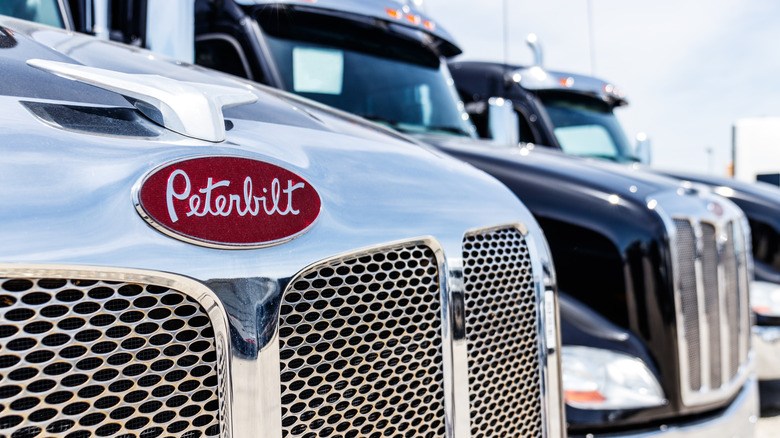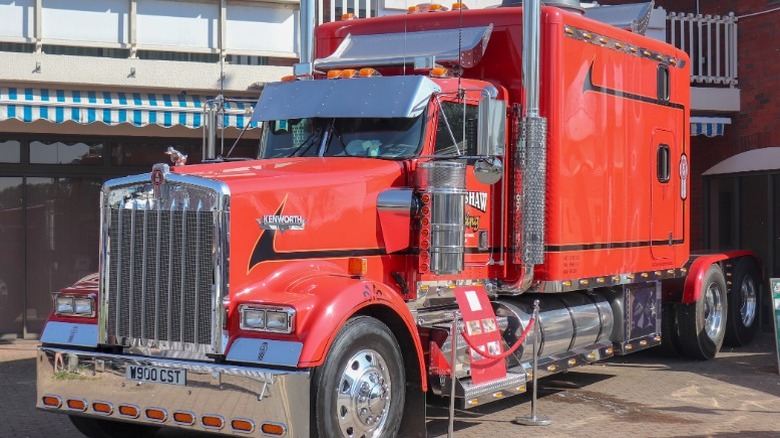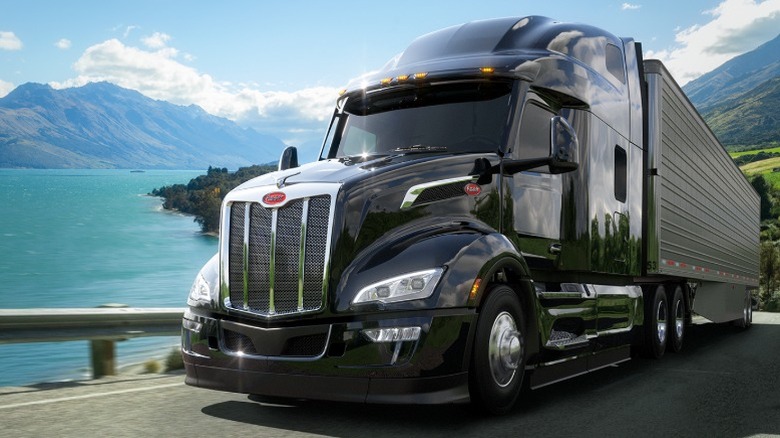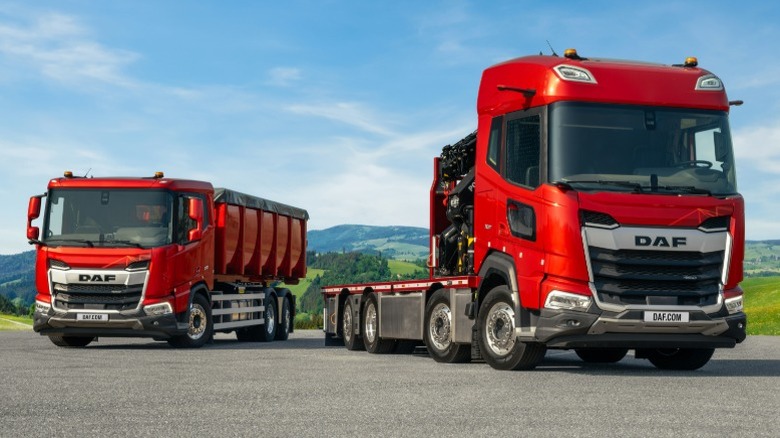3 Semi Truck Brands Owned By Paccar
Paccar may not be a household name for those unfamiliar with semi-trucks, but the Bellevue, Washington-based company is a major player in the heavy truck industry. Formerly known as the Pacific Car and Foundry Company, Paccar has a long, 100-year-plus history making everything from railroad equipment to winches, and currently makes a selection of engines, like the MX-13, that can be found under the hoods of semi-trucks from brands you may be more familiar with.
These brands include Peterbilt and Kenworth, both of which Paccar currently owns, having acquired them in the middle of the 20th century. Paccar engines also feature in DAF trucks, another Paccar subsidiary and, as of 2025, the only one not headquartered in North America. While Paccar itself may not be a headline-grabbing brand, its products — and ownership — mean it's an integral part of the modern trucking industry as we know it. As for Paccar itself, it's a publicly-traded company that makes its products globally, with facilities in the U.S., the Netherlands, and Brazil.
Before we start, it's worth noting that there used to be a fourth trucking brand under the Paccar umbrella — British truck and bus manufacturing firm Foden, which Paccar acquired in the 1980s. While it had a good few decades under Paccar, the American company discontinued the Foden brand in 2006, after moving most of Foden's offerings into the DAF lineup.
Kenworth
Kenworth is the oldest of the three active semi-truck brands Paccar currently owns. Paccar acquired the semi-truck manufacturer in 1945, back when it was still Pacific Car and Foundry Company. Paccar's purchase of Kenworth was its first foray into heavy trucks, with the company having primarily focused on serving the railway and logging industries until then. Kenworth itself was a relatively young brand at that point, only having been around for just over two decades after Harry Kent and Edgar K. Worthington first teamed up in 1923.
Paccar's acquisition of Kenworth allowed the firm to return to its Seattle roots after needing to move production during WWII. It also provided the impetus for it to begin expanding its sales beyond North America. Under Paccar's auspices, Kenworth produced a range of now-iconic semi-trucks, including the soon-to-be-discontinued W900 and ground-breaking (for 1985) T600, which some credit with revolutionizing the trucking industry thanks to its aerodynamic body and focus on fuel efficiency.
Kenworth continues to produce a range of trucks to this day, including heavy-duty semi trucks, vocational vehicles such as the T880 and L770, and medium-duty offerings, like the T380. As you might expect, given its ownership, Kenworth's offerings can all be purchased with Paccar engines. The current T680 has Paccar engines exclusively, while older models such as the W990 and W900 Legacy Edition still offer Cummins engines. Smaller trucks, such as the aforementioned T380, also have Cummins engines available alongside Paccar products. Kenworth has also recently started offering electric trucks, including EV versions of the T880 and T680.
Peterbilt
The post-war decades were busy for the Pacific Car and Foundry Company. Not content with gaining a foothold in the heavy-duty truck market by acquiring Kenworth in 1945, the Washington company would soon strengthen its presence by purchasing Peterbilt in 1958. Paccar also purchased Dart Truck that same year, but that's another story for another time.
Peterbilt, which currently makes its trucks in the U.S. and Canada, first started in 1939 when Washington-based Theodore Alfred "Al" Peterman purchased a struggling truck company called Fageol. Peterman started small, with the fledgling company only building 40 trucks in 1940, but business would eventually take off thanks to classic semis such as the Model 351, which debuted in 1954.
Paccar didn't rock the boat much at Peterbilt: the company continued to build the semis it was becoming known for, including the Model 379 that's likely most famous for playing the part of Optimus Prime (well, his truck form, at least) in the first three live-action "Transformers" movies. It would also expand into medium-duty offerings in the 1990s with the Model 330, and it's that mix of heavy and medium-duty trucks that characterizes Peterbilt's offerings to this day, with both Paccar and Cummins engines — including the latter's natural gas options — available in most of its offerings. Peterbilt currently offers a wider range of EV trucks than Kenworth, with four available across Classes 6, 7, and 8.
DAF
The last of the three still-extant semi-truck brands that Paccar acquired is the Dutch firm DAF, which joined its new sister companies Kenworth and Peterbilt in 1996. Paccar paid $543 million — which works out to more than $1 billion in 2025 — for the Dutch company, which continued to operate independently from Paccar. According to contemporary reports, DAF's roughly 25,000 sales in 1995 would grow Paccar by around 40%, going some way to explaining the large sum it paid.
While DAF is a relatively new member of the Paccar family, the firm itself has a long history, with its roots going back to an Eindhoven, Netherlands-based construction firm set up in 1928. While DAF's trucks may not have quite as much cachet with Americans as those from Kenworth and Peterbilt, the Dutch company's contributions to the world of heavy-duty trucking are impossible to overlook, with DAF being one of the first companies to offer diesel engines that were both turbocharged and intercooled, back in 1973.
DAF currently makes several truck models for heavy-duty, vocational, off-road, and city use, all sporting some form of Paccar engine. DAF's long-haul semi-trucks such as the new XF and XG can be spec'd with either the MX-11 or MX-13 in Europe, while smaller offerings like the inner-city-focused DAF XB have Paccar's four- and six-cylinder engines, the PX-5 and PX-7. Interestingly, certain international-market versions of DAF products, like the Australian DAF XG+, come with Cummins engines — in the XG+'s case, it's the Cummins X15D, the company's most powerful heavy-duty truck engine to date.



